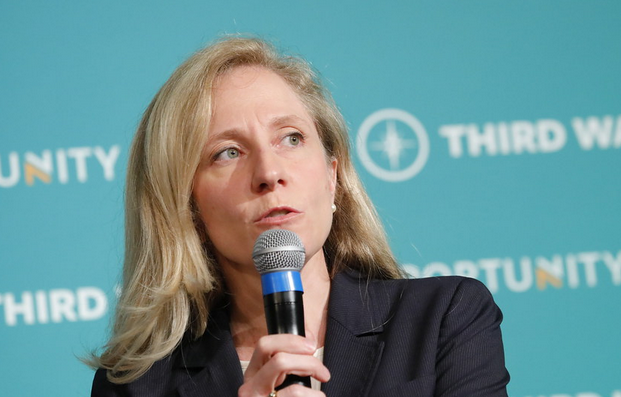During a recent candidate forum, Virginia Democratic gubernatorial hopeful Abigail Spanberger made a startling and deeply troubling assertion: that religiously affiliated hospitals should not be permitted to follow their faith-based principles when it comes to assisted suicide. Her remarks mark a serious departure from both constitutional precedent and long-standing American commitments to religious liberty.
The exchange began with a question from Debra Riggs, Executive Director of the Virginia and Metro DC chapters of the National Association of Social Workers. Riggs has a well-documented history of aligning NASW with progressive positions on abortion, gender ideology, and so-called “reproductive justice” positions that routinely clash with mainstream religious and ethical perspectives.
Her question was framed with disdain and suspicion toward Catholic hospitals, characterizing their refusal to promote euthanasia as a form of obstruction in the doctor-patient relationship.
“Some religious healthcare institutions, most notably catholic healthcare institutions and systems routinely place themselves in the middle of doctor-patient relationship and prohibit their doctors from informing patients that medical aid in dying isn’t even an option,” Riggs said.
Click Like if you are pro-life to like the LifeNews Facebook page!
“What are your thoughts on legislation that would legalize medical aid in dying? And more generally what are your thoughts on permitting religious health care institutions to dictate what their physicians are allowed to discuss with their patients?”
Spanberger responded without qualification.
“I oppose the ability of religious institutions to put their religious-based ideas on individuals and their healthcare choices and options… I do not believe that people should have the option to allow their own personal beliefs to dictate the type of medical care that they are providing their patients.”
This is not merely a policy disagreement. It is a constitutional warning shot.
The First Amendment does not stop at the church door or the private individual. It protects religious institutions, including hospitals, from government mandates that force them to violate their doctrines. Spanberger’s position implies that religiously affiliated health care providers, Catholic hospitals among them, should either abandon their core principles or risk being legally compelled to violate them.
That notion is not only morally troubling, it is legally untenable.
Federal law, including conscience protections within the Affordable Care Act, explicitly prohibits discrimination against entities that decline to participate in active assisted suicide or euthanasia. These protections are not optional preferences. They are constitutional safeguards meant to ensure that participation in health care does not come at the cost of one’s most deeply held beliefs.
What Spanberger proposes is not a neutral public policy. It is a demand for ideological conformity under threat of legal penalty. It reduces religious liberty to a conditional privilege, revocable when it conflicts with the policy goals of the state. That view cannot coexist with a pluralistic society governed by the rule of law.
Furthermore, the implications reach far beyond the issue of assisted suicide. If a state government can compel Catholic hospitals to offer, or even discuss, end-of-life lethal prescriptions that directly contradict church teaching, what principle prevents it from forcing other institutions to betray their moral or religious convictions? Once the state grants itself the power to redefine what religious practice may entail, religious freedom becomes a hollow doctrine.
This is not hypothetical. In countries like Canada, religious objections to euthanasia have already been steamrolled. Hospitals that refused to comply with euthanasia lost funding, lost contracts, and in some cases were shut down. The same coercive trajectory begins when elected officials in the United States declare that faith-based institutions must submit to state orthodoxy in matters of life and death.
Religious liberty is not an obstacle to health care. It is an essential part of a free and diverse society. The Constitution does not exist to protect popular opinions. It exists precisely to protect the rights of those who dissent, particularly in matters of conscience and faith.
Spanberger’s remarks are not a gaffe. They are a window into how far some are willing to go to prioritize ideological consistency over constitutional rights. Voters and lawmakers should take her at her word and reject the premise that the state may dictate the moral framework of faith-based institutions.
If Virginia’s next governor views religious liberty as a dispensable formality, then every citizen—religious or not—should consider what other rights could be deemed expendable next.
The post Virginia Democrat Abigail Spanberger Wants to Force Christian Hospitals to Do Assisted Suicides appeared first on LifeNews.com.
Click this link for the original source of this article.
Author: Raimundo Rojas
This content is courtesy of, and owned and copyrighted by, https://www.lifenews.com and its author. This content is made available by use of the public RSS feed offered by the host site and is used for educational purposes only. If you are the author or represent the host site and would like this content removed now and in the future, please contact USSANews.com using the email address in the Contact page found in the website menu.





